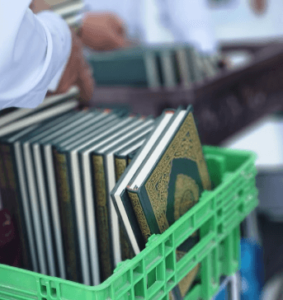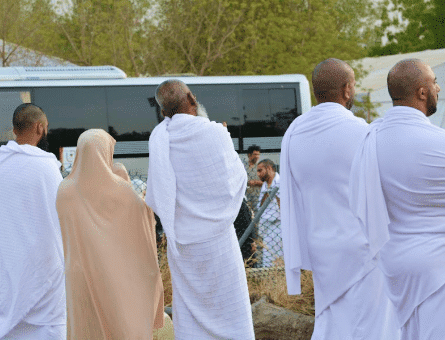Can I perform Umrah for someone else? Everything you need to know
Are you wondering, “Can I perform Umrah for someone else?” Yes, you can. Offering the Hajj or Umrah on behalf of someone else is permissible. However, it does come with its own set of rules and conditions. You can only perform Umrah on behalf of someone else if they are deceased, unwell, or physically unable to perform the pilgrimage.
Hajj and Umrah are religious duties that must be performed at least once in an able person’s lifetime (granted that they are physically and financially stable). Financial stability means someone who can pay for all their expenses including transport, accommodation, food, etc.
Being physically able refers to someone who is in good health and can take care of themselves throughout the journey. In case a person isn’t financially or physically capable of performing Hajj or Umrah by themselves, the person performing it on their behalf should start by making niyat in their name when entering the state of Ihram. Following this, they should perform all the rituals while intending to do so on behalf of the person in question. Read on to learn more.
Can I Perform Umrah for a Deceased Person?

Yes, it is permissible to perform Umrah on behalf of a deceased person. Pilgrims are even allowed to perform an extra Umrah after Hajj for a loved one who has died.
When performing Umrah on behalf of someone else, start by saying “Labbayka Umrat’an (name of the person you intend to perform Umrah for). In case you do not remember their name, then simply say, “Here I am on behalf of the one who delegated me to perform Hajj,” or any similar statement. Indeed, Allah SWT knows who this person is.
You are not required to repeat the same during Tawaf (circumambulation), Sa’ee (going back and forth between Mount Safa and Mount Marwa), standing at ‘Arafah, spending the night at Muzdalifah, throwing the pebbles, and so on. It is enough for you to intend it at the beginning of Ihram for Hajj or Umrah. (Shaykh Ibn Uthaymeen)
Can I Perform Umrah for My Father and Mother?
If your parents are suffering from a chronic illness or are physically weak to perform Umrah or have passed away, in these circumstances, you are allowed to perform Umrah on behalf of your parents. However, if your parents are financially unable to perform Umrah, in this case, you cannot do Umrah for them. Instead, you should invite them for Umrah (pay for their expenses).
One dua you can make for your parents’ happiness is the following. “RabbiawziAAnee an ashkura niAAmataka allatee anAAamta AAalayya waAAalawalidayya waan aAAmala salihan tardahuwaaslih lee fee thurriyyatee innee tubtuilayka wa-innee mina almuslimeen” “My Lord, enable me to be grateful for Your favor which You have bestowed upon me and upon my parents and to work the righteousness of which You will approve and make righteous for me my offspring. Indeed, I have repented to You, and indeed, I am of the Muslims.” (Quran 46:15)
According to the Fatawa al-Lajnah al-Daimah, 11/81: “If you have done ‘Umrah on your own behalf, it is permissible for you to do ‘Umrah on behalf of your mother and father if they are unable to do it because of old age or sickness for which there is no hope of recovery.”
The Fatawa mentioned above is given in light of several events throughout Islamic history. For example, once a man asked the Prophet Muhammad (peace and blessings of Allah be upon him) for permission saying: “O Messenger (PBUH) of Allah SWT, my father is an old man who cannot do Hajj or ‘Umrah. The Messenger (PBUH) of Allah SWT replied: “Do Hajj and ‘Umrah on behalf of your father.” [Ibn Majah]
Can You Carry Umrah for More Than One Person?
The ritual of pilgrimage can only be done on behalf of one person at a time. This means that you cannot perform Umrah for more than one person at a time. Instead, you will have to do two Umrahs on behalf of two people. When performing Umrah for more than one person, you should start the second one from outside the area of Masjid Al-Haram; the nearest is the masjid at-Tan’eem.
Al-Nawawi (May Allah Have Mercy Upon Him) said in al-Majmoo’ (7/126), “Our companions said: If two men hire a man to do Hajj on their behalf, and he enters ihraam on their behalf, then his ihraam becomes his and is not counted on behalf of anyone else, because ihraam cannot be entered on behalf of two people, and neither of them is more entitled than the other.
If he enters ihraam on behalf of one of them and on his own behalf at the same time, then his ihraam is on his own behalf because it is not permissible to enter ihraam on behalf of two, and he is more entitled to his ihraam than anyone else, so it is his.” (Al-Shafi’i in al-Umm, and he was followed by Shaykh Abu Haamid, al-Qaadi Abu’l-Tayyib)

What about Hajj? Can This Be Performed on Someone Else’s Behalf?
While Umrah is a nafl, performing Hajj is a fard (obligatory) to act upon by Muslims who are physically and financially able. However, when asked if one can perform Hajj on behalf of someone else, Prophet Muhammad (PBUH) mentioned two scenarios in which performing pilgrimage on behalf of others is justified and allowed:
“The person does not have the ability to perform Hajj.” (Sahih Bukhari 1853)
This means that the person has financial issues or is suffering from a severe illness that doesn’t permit them to travel, or has died.
Ibn Abbas (RA) narrated that once a woman came to the Prophet Muhammad (PBUH) and said: “O Messenger (PBUH) of Allah SWT, the command of Allah SWT to His slaves to perform Hajj has come when my father is an old man who cannot sit firmly in the saddle. Can I perform Hajj on his behalf?” He said: “Yes.” (Ibn Majah)
The Messenger (PBUH) of Allah SWT also mentioned that one can only perform Hajj on behalf of someone else if “You have already performed Hajj yourself.” (Sunan Abi Dawud 1811)
Ibn Abbas (RA) reported that Prophet Muhammad (PBUH) once heard a man say, “Labbayka (Here I am) on behalf of Shubrumah.” [i.e., he was performing Hajj on behalf of Shubrumah]. He (Prophet Muhammad (PBUH)) asked, “Who is Shubrumah?” The man replied, “He is a brother (or a relative) of mine.” The Prophet (PBUH) asked, “Have you performed Hajj for yourself?” The man said, “No.” Then the Prophet Muhammad (PBUH) told him, “Perform Hajj for yourself first, then perform Hajj on behalf of Shubrumah.” (Abu Dawud)
Can I Perform Umrah with My Mother?
You are only permitted to perform Umrah with your mother if you are her mahram (biological son and have reached puberty). However, if you are a daughter, note that you and your mother are not allowed to perform Hajj without a mahram (father or brother) according to the majority of scholars. The Saudi Ministry of Hajj and Umrah usually requires proof of relationship (birth certificate of the child) in order to permit you and your mother to travel to Makkah for Umrah.
What Duas to Read During Umrah?
Even though there are no specific duas that must be recited during Umrah, we have compiled a list of duas that Prophet Muhammad (PBUH) used to recite while performing Umrah or those that the scholars generally recommend:
Dua to Recite When Entering the State of Ihram:
Dua: Allauhumma innee uridul umratan; fayassir haa li wa taqaubalahaa minnee.
Translation: O Allah! I intend to perform Umrah. Make it easy for me and accept it.
After Ihram, recite the Talbiyah:
Talbiyah: Labbayka Allahumma Labbayk. Labbauka La Sharika Laka Labbayk. Innal Hamda Wan-ni»mata laka Wal-mulk. La Sharika Lak.
Translation: Here I am at your service, O Allah Here I am at your service. Here I am at your service, you have no partner, and here I am at your service. Truly all praise and blessings belong to you, and so does sovereignty. You have no partner.
Duas to Recite When Performing Tawaf:
Dua: Bismillahi Allauhu akbar wa lillahil hamd.
Translation: I begin with the name of Allah, Allah is the Greatest, and all Praise is to Allah.
Dua: Raubanaa aatinaa fiddunya hasanah wa fil akhirauti hasanah wa qinaa a’zab annaar.
Translation: Our Lord, give us in this world [that which is] good and in the Hereafter [that which is] good and protect us from the punishment of the Fire.
Dua to Recite When Performing Sa’ee
Dua: Innassaufaa wal marwata min sha-airillah, faman hajj al bayta awi-tamara falaa junaaha a-laihi aiyattawafa bihi maa, wa man tatawwa-a khairan fa innAllaha shaakirun a-leem.
Translation: Indeed, Safa and Marwah are among the symbols of Allah SWT. Hence, whosoever performs Umrah at the Holy Kaaba can safely walk between them without fearing any sin. And Allah Knows and appreciates him who does any good with a willing heart.
Dua When Leaving Masjid-al-Haram
Dua: Bismillahi, wassaulatu wassalamu a’la rausulillah, Allauhumma Innee As aluka min fadhlik.
Translation: I begin with the name of Allah, Blessings, and peace be upon the Prophet (PBUH) of Allah; I ask you out of your Abundance/favour.
What If I Don’t Have a Mahram?
A mahram is a man whom a woman is forever forbidden to marry because of blood ties, this includes her father, brother, and son. According to the classical teaching of Islam, a woman cannot perform Hajj or Umrah without a mahram.
“Ibn Abbas (RA) narrated that: “The Messenger (PBUH) of Allah SWT said: ‘A woman is not to travel except with a mahram, and a man is not to enter upon her except if she has a mahram.’””
Ibn’ Abbas (RA) narrated: “I heard the Messenger (PBUH) of Allah SWT say, when he was delivering a sermon, ‘”No woman should travel except with a mahram.’ A man stood up and said, ‘O Messenger (PBUH) of Allah SWT, my wife has set out for Hajj, and I have signed up for such-and-such a military campaign.’ The Prophet (PBUH) said: ‘Go and do Hajj with your wife.'” (Narrated by al-Bukhari, 3006; Muslim, 1341)
On the contrary, according to the revised rules by the Saudi Ministry of Hajj and Umrah as of July 18, 2021, women are now allowed to perform pilgrimage without a male guardian only if they go in a group. However, here are some things that Muslim women must be mindful of when going on pilgrimage without a mahram:
- She must know how to take care of herself and should not wear clothes or perfume that can attract the attention of men.
- She must pray in the women’s area.
- She must maintain a safe distance from the crowd.
- She should stay with her group and not interact with anyone without a valid reason
- She should recite Talbiyah in a low voice.
Summary – Can I Perform Umrah for Someone Else?
Umrah is a non-mandatory religious obligation and a beautiful Sunnah of Prophet Muhammad (PBUH). Every year, millions of Muslims travel to Makkah, Saudi Arabia to perform Umrah.
It is not permissible to perform Umrah or Hajj on behalf of a living person (someone who is physically and financially able).
However, if the person is not able to complete the obligation by themselves because of sickness or on account of having passed away, in this case, someone else can perform Umrah or Hajj on their behalf.
Explore The New Pilgrim App
The Ultimate App
for Hajj and Umrah!














